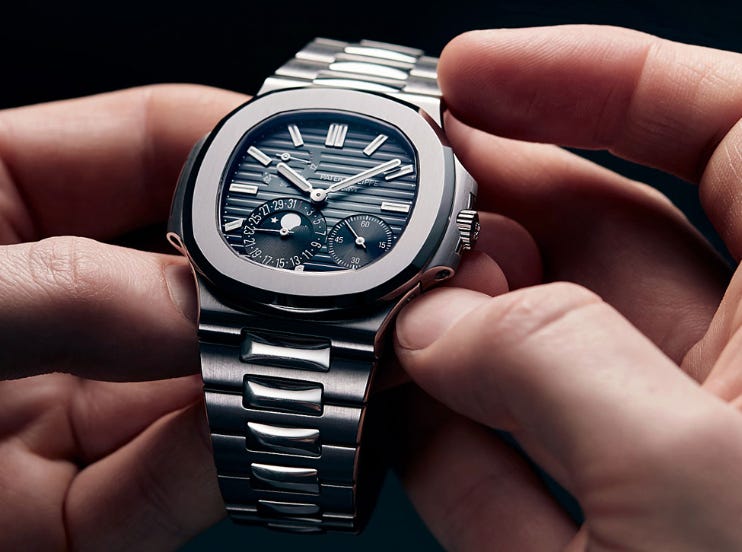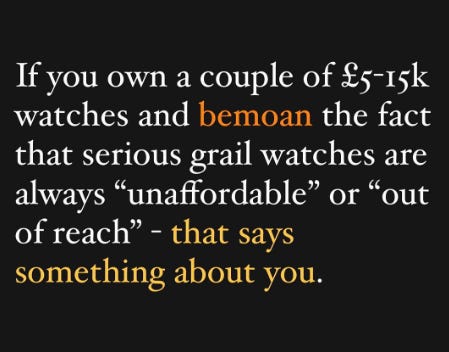How do you decide what watch to buy?
A discussion unpicking the thought processes beneath a purchase
Someone on Instagram sent me this DM quoted below, and I thought it would be an interesting topic to discuss. (I am quoting verbatim, minus a ‘shrug’ emoji at the end and censoring ‘sh*t’)
“I’m curious… after talking with you and seeing your posts for some time you don’t come across as a guy that would easily part with the money it would take to buy a FPJ. What am I missing? How do you get past the cost? I ask, because I struggle with the thought of paying more than ~15k for any watch. All while I have a sh*t ton of money in watches”
We continued chatting, and established that his version of ‘sh*t ton’ was around US$120k. The overall discussion eventually got to the crux which was that this gentleman couldn’t come to terms with spending 20-30k on a single watch but was happy to spend over 100k on many watches. One particular point he did mention, was the idea of personal safety being on the line when wearing a single 120k piece on the wrist.
This question and subsequent discussion got me thinking about my previous posts, as I was sure I had covered this somewhere in previous posts. I found a couple of related posts, which I will try to build on - I’ll share them here as well:
Turns out, I may be delusional I do not seem to have actually explored this topic directly before, and so this post is probably long overdue. I will draw on some of the material in the Nudge post linked above, as it has a lot of useful threads to pull on.
Following that, I created this post on Instagram, which was possibly one of the most polarising posts I have shared in recent memory - below I have pasted the first slide, use the link to see the full post (I can’t seem to get this link to embed on Substack!) - worth reading through the comments!
There was a mix of agreement, and vehement disagreement - but what I think triggered people is their dislike for being put into a particular box. Some mentioned the merits of owning several pieces versus sacrificing them all to own one particular grail - one person I recall even said it behooves us to own more than one, otherwise we cannot call ourselves ‘collectors’ but ‘the owner of a watch’. I mean, if that’s what he believes, who am I to argue!? I thought that was a good preamble into the rest of this post.
Where do we begin?
I recently posted about the Ambiguity Effect, and Sfwtachlover made a great comment which I will build on here.
He talks about the decision-making process, and suggests classifying ‘future purchase options’ into relevant groups - this is akin to ‘comparing apples with apples’ when it comes to deciding how to spend your money. In my reply, I explain that the idea of weighing a purchase against its own ‘peer group’ is sound, only if you have no budget constraint! Without unlimited funding, it is unlikely that anyone will be able to lay out several purchase options and also pursue options in more than one or two buckets at a time.
Still, I think he was onto something, and I may be stating the obvious, but this begins with an exercise in prioritisation.
How to prioritise?
Going back to the original question above, posed via DM, every collector is going to have a different risk appetite, and their list of desired characteristics in a watch will
also vary. As the comments on the Instagram post I shared above will demonstrate, everyone also has a different approach to collecting, and some even have a variable definition of what it means to be a watch collector. I must emphasise: Nobody is wrong - to each their own!
Some folks enjoy complications, and others enjoy extremely versatile and hard-wearing pieces. Within those and other such ‘buckets’, we will have broad constraints. This looks something like this: (made a quick table in excel, as there was no easy way to insert a table here!)
So in terms of making a decision, I would typically start on the left, assuming we have no particular watch in mind, only the ‘intent’ to buy a watch (we will return to the situation where we see a particular watch and weren’t actively looking for it). So you decide you want a waterproof steel watch around 39-42mm with a case no thicker than 11mm and do not wish to take more than a 30% haircut off retail. Were you to go out and apply those parameters to a search, you’d land on plenty of options including a Nautilus, VC Overseas, Tudor BB/Pelagos, Rolex Submariner, Omega Seamaster, Seiko SKX and even a Unimatic!

At this point the decision becomes more nuanced… “Value” here, is a mix of price and what you think something is worth to you. If someone offered you a Patek Phillipe Nautilus for £5,000 on condition you could never sell it, would you take it? How about if you didn’t have the cash, and potentially needed to get a loan or go into overdraft, or max out a credit card etc.? I’d guess that many people reading this, would say “yes”.
Objectively, you would be £5,000 poorer, because you can’t sell it; but since it is a widely established ‘belief’ that this is a highly desirable, sought-after watch… the enjoyment for many watch enthusiasts would be in the fact that they got something of high value for what seems to be a very low price. But, I digress…
So once you get to the assessment of value, things become difficult to articulate. This is where our friend from the DMs gets confused as well. This is why I made two tiers:
Value retention: this is the reason why watch collecting exploded as a hobby in the last 4 years. There have always been watch enthusiasts, geeks, maniacs… folks who would sink countless hours and currency into buying these trinkets - for the most part, they would be lucky to exit a piece and break even financially. In my memory only the Rolex Daytona was a waitlisted piece which traded above retail - even wrote a post about the Daytona (for another time). As a result, many collectors (even older, experienced ones) are making purchase decisions with this new criteria in mind… The thought process goes something like this: “why would I buy a Seamaster for £8000 when I can buy a Submariner for £9000 and never lose money if I decide to sell…in fact, if I wanted to, I could sell it on the same day for a profit.” Sure, and even if the person claims to objectively like the Submariner, one can never be sure how much they really want it, versus the Seamaster, and how much they are being swayed towards the Submariner because of the value retention characteristic.
Value: as explained above, a mix of price and worth to oneself. So the first thing to bear in mind, is relative wealth. If you are a multi millionaire, perhaps the Submariner vs Seamaster debate is irrelevant, you will buy the one you like; hell, you might even buy both. Just bear in mind the discussion is around principles ad any brands or models being mentioned can be scaled accordingly to particular levels of relative wealth. When you are wearing a watch that is worth one month’s salary, it has a certain impact on you. When it is worth one year’s salary, it has a very different impact on you - despite being insured etc. They give you, the wearer, different feelings. In addition, they give a casual observer or fellow collector, different feelings as well (like the guy in my DM chat above). This value point is the bottom of the table, because it is the most influential one - beyond being the main filter “can I afford this watch”, it goes deeper still…
What is the point? Well, this is where the second column in the table becomes relevant. When you’re considering the value of any watch purchase and subsequently evaluating how you might enjoy it, your own circumstances, like wealth, geographical location (security, weather etc) and general way of life (active lifestyle, formal events, etc) will also become relevant too. You could be a billionaire, but unless you have full time close-protection, you could always be the victim of assault and robbery if you wore a Nautilus openly in the streets of London or San Francisco. Would you want to take this risk? Assuming you are resigned to wearing it under a sleeve and in your office only, or exclusively at private gatherings with people you know… this might mean you will only wear it 3-4 times per year? In that case, would you be better off getting something else you are likely to enjoy more frequently? If you have several other watches because you can afford to have so many, then maybe this doesn’t matter. Only you know the answers to these questions, and the answers will, by definition, vary for all collectors.
How about psychological motives?
Having shared these thoughts with drjuanola on Instagram, his feedback was that these views ignore the fact that many collectors are looking for something deeper, looking to achieve some sort of purpose beyond just the utility value of a watch. I agree with this, and his feedback reminded me of Maslow's hierarchy of needs.

Perhaps there is something to be said about finding one’s own version of this pyramid with regards to watches?
For many seasoned watch collectors, there is no utility in simply accumulating watches with no underlying purpose in mind. Sure, there may be a practical starting point to each purchase, as outlined in the previous section… a dress watch, an outdoor watch, a ‘special occasion’ watch and so on… but after a few decades of collecting watches, perhaps even selling some, missing them, buying them back, seeing their own tastes and preferences change… there are many who find their own true north. Some end up spending decades just chasing some ‘holy grail’ in an obscure reference of a particular watch they believe exists, but have yet to see in person; others aim to collect only within a certain era and limit this to a particular brand. Here’s a quote from ‘drjuanola’ regarding his approach:
“I am thinking of adding only watches that will make my collection more perfect and harmonious within itself”
Who am I to argue with that? You can DM him yourself to understand what exactly he means; this sort of wisdom, insight and food-for-thought is also why I once wrote that all less experienced collectors need a mentor. You can read that post here:
A guy like drjuanola is at a stage in his collecting journey where, for 120k, would much rather own a Patek 3417 in amazing condition, than a couple of other 10-30k watches which are collectively worth 120k. That is what he wants, and all his years of experience, of trying other watches, of owning other pieces… have led him to this point. That does not mean anyone else will feel the same, nor does it mean that everyone will eventually reach a similar conclusion. All it really boils down to, I suppose, is that after your practical physical needs in a watch are met, there’s a whole other realm of personal motivations to explore… many of which I have explored before (status, perceived value, etc).
Concluding remarks
This post seems to have dragged on for too long… so I will wrap it up. Please add any feedback regarding obvious errors and omissions and I will be happy to address them in a follow-up post.
So, back to the original DM question, and how I get over the ‘concentration' of value’ in individual watches… I’m a paranoid person as a result of growing up in Africa, and living/working in Johannesburg for a long time. It’s such a ridiculous place, they have an infamous Rolex Gang (that’s their actual name!). It’s the sort of place where you would be followed home from the mall, because they spotted a Rolex on your wrist… they will then hold you and your family up at gunpoint, and rob your entire house. As a result, I aim biased towards showing NOTHING to anyone in my daily life. If I know it will be a hot day where I have no jacket to cover a watch, I simply wear a low value watch which has zero signaling potential to any potential thief. As a result, when I do wear more expensive watches, I am 100% confident that I am doing so for myself, and only myself. All ego goes out of the window, because I know that revealing it could easily put me and my family at risk.
Sure, I could be a victim of completely random crime - where I am mugged for my phone and spare change, and the thief happens to also steal my watch… but again, if I know I will be walking in random places at night, or out after hours, I just avoid wearing anything that is not easily replaced (either because of rarity or cost).
As a result, I have a fairly good idea of how often I might be able to wear a very expensive watch, versus an inexpensive one. Same goes for a hyped watch, versus a less hyped on (e.g. Rolex Daytona versus Breguet 3237 - similar value, but huge difference in hype, and therefore, risk). As an aside, this is one of the reasons why I am considering selling the Daytona, and then only reason I do not sell it, is because I take pride in owning one, possibly as a status thing… it is probably ego, to be honest.

In the end, I could sell that and buy a vintage Vacheron Constantin Perpetual calendar, like this one, which is objectively a LOT more watch for the money, but I don’t - and perhaps that is because the ‘value in ownership’ to me still favours the Daytona. Would it be the same for you? Only YOU know the answer to that.
I guess, my response to the question we started with, is that I would conclude the aversion to spending >20-30k on a single watch is down to appetite for risk, and ay other personal motivations for buying anything of value. If the object of your desire, for whatever reason, happens to be 120k, then you' ought to get it. If you don’t, then you obviously do not desire it as much as you think - which is fine!
The remedy, if we can call it that, is to actually buy more ‘obtainable’ 20-30k watches first; like a Vacheron Overseas 4500V or a Moser Streamliner, and try them out for a while. It could be a breakeven experiment, or you might have to sell it at a 10-20% loss if you don’t end up getting comfortable with it, but I suspect there is no other way to find out. Once you’ve become comfortable spending 30k, it will not be a stretch to spend 50k… and eventually, before you know it, you’re off to the races, consolidating like, surprise surprise, you only have one wrist! lol. Ok, I’m going… goodbye.






Very interesting and something I've been thinking about alot. I don't buy watches for other people to enjoy. I also don't buy for value, but after value/value retention certainly makes the justification for spending the money easier. Living in Houston, and having relatively unknown, albeit somewhat expensive watches, I have no concerns about security. What I have discovered is that even more than the monetary value of the watch is the value of the relationships associated with the purchase. I gravitate towards small independent watch brands because I value the ability to meet the watchmaker, understand their vision and philosophy. Following their journey and knowing I'm wearing a part of that journey is exceptionally meaningful for me.
That said, I do like the Nautilus for 5k, even if I couldn't sell it. But I could give it to my kids when I die and they could sell it. Nothing like a loophole. 😂
I struggle with the core premise of this entire exercise, that is the attempt to impose rational criteria upon an essentially irrational decision. A core principle I live by is that people arent rational, we just rationalise the emotional decisions we were always going to make. I suspect your tools will be mostly that - post hoc rationalisations of previous decisions.
Having said all that one thing I'm curious about is how you'd model Des(cum) - ie the cumulative desire for a number of watches vs the unique desire for any one of them. I feel your model tends to drive towards a 1:1 comparision between a (for example) 120k watch and a 15 k watch but what is the value of looking into a box and seeing 8 watches instead of one? For a real life practical example - consider the recent tag-kith collab. Purchasing the box of all of them was a 20ish% premium over buying each individually because the collection was quite literally worth more than the sum off its parts. Perhaps instead of considering watches, consider alternative collections to a given dollar value?
I guess Im curious because thats my approach - I want a watch collection, not a collection of watches. I know what I want my collection to be and the purchasing decision is not will I buy this watch instead of that watch but rather will I buy this watch now and that watch later.